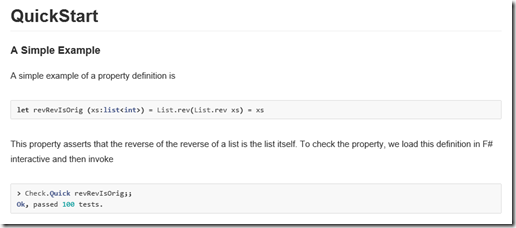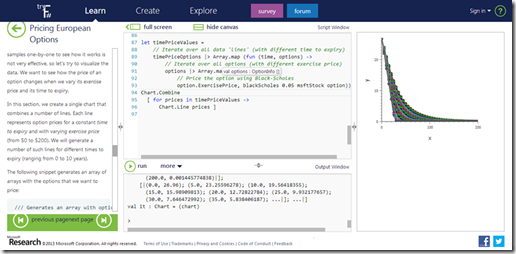Last night I popped down to Southampton to talk about F# in the Enterprise at the Developer South Coast meetup started by John McLoughlin. The group has grown quite a bit since last time I was down in 2010, and the hall was packed with about 50 members. It’s a really friendly group with a lot of interesting activities going on including hack weekends covering everything from electronics all the way through to games programming.
John contacted me after interest in a deep dive session on F# from the group.
Testimonials
At the start I covered a selection of testimonials captured on the F# Foundation site which gives some idea of where people are applying F# and the kind of benefits they’re seeing. .Net Rocks is another good source featuring interviews with F# developers talking about their experiences on projects, most recently Yan Cui from GameSys and Kit Eason on F# in Insurance.
order of magnitude increase in productivity, GameSys
performance is 10× better than the C++ that it replaces, Aviva
Take a look for yourself: http://fsharp.org/testimonials
Testing
The F# community has a strong testing focus with plenty of posts and libraries on the subject. As F# is a .Net language it works with all the regular .Net testing frameworks including NUnit, xUnit and MsTest:
open NUnit.Framework
let [<Test>] ``2 + 2 should equal 4`` () =
Assert.AreEqual(4, 2 + 2)
Or using the popular FsUnit library you can make your assertions fluent:
[<Test>]
let ``2 + 2 should equal 4``() =
2 + 2 |> should equal 4
Stephen Swensen’s Unquote library takes a novel approach:
let [<Test>] ``2 + 2 = 4`` () =
test <@ 2 + 2 = 5 @>
If a test fails unquote can help you uncover what went wrong:
Test 'Tests.2 + 2 = 4' failed:
2 + 2 = 5
4 = 5
false
FsCheck a library based on QuickCheck is another F# library worth a look. FsCheck lets you fuzz test your functions which can help find those bugs that are harder to uncover with hand written unit tests. FsCheck can also be called from C#:

Types
Dependency injection (DI) is commonly employed in enterprise C# code. DI can make code more testable by injecting dependencies as interfaces to a class’s constructor:
public class HolidayService
{
private readonly IFlightBooking _flights;
private readonly IVillaBooking _villas;
public HolidayService(IFlightBooking flights, IVillaBooking villas)
{
_flights = flights;
_villas = villas;
}
public bool CanBook(DateTime date)
{
return _flights.Available(date) && _villas.Available(date);
}
}
This can be expressed in F# as a class type:
type HolidayService(flights:IFlightBooking,villas:IVillaBooking) =
/// Returns can book status
member this.CanBook(date:DateTime) =
flights.Available(date) && _villas.Available(date)
The F# code generates the same IL as the C# code and works with all the major .Net dependency injection frameworks. I’ve personally used both Castle Windsor and more recently AutoFac.
If you’re using interfaces or abstract classes to inject dependencies you can provide mock instances when you test. This can be useful if for example you have code that interacts with a database or uses the current time.
F# 3 works seamlessly with all the major .Net mocking libraries like Rhino Mocks and Moq. If you’re looking for something that takes advantage of F#’s type inference features you might want to try out my imaginatively named Foq library which has a similar API to Moq:
let [<Test>] ``on no flights available you can't book`` () =
let flights =
Mock<IFlightBooking>
.Method(fun x -> <@ x.Available @>).Returns(false)
let service = HolidayService(flights, mock())
Assert.False(service.CanBook(any()))
That said it’s pretty easy to create an instance of an interface using F# built-in object expressions, so for many tasks a library is not needed:
{ new IDisposable with member __.Dispose() = printf "Disposed" }
And if you have interfaces with a single method you may just as well pass a function:
type HolidayService(hasFlight:DateTime->bool, hasVilla:DateTime->bool) =
/// Returns can book status
member this.CanBook(date:DateTime) = hasFlight(date) && hasVilla(date)
Type Providers
Type Providers are a feature unique to F# introduced in F# 3, that enable easy typed access to diverse data like databases, web services and even programming languages. In the presentation I showed Tomas Petricek’s World Bank sample running in Zach Bray’s FunScript. FunScript gives typed access to JavaScript libraries via a Type Provider to TypeScript and compiles F# code to JavaScript. The 80 line sample uses jQuery and HighCharts to show data pulled from the World Bank:

For more example’s check out Don’s 12 Type Providers in pictures post.
Twitter
Thanks for all the great feedback on Twitter (here's just a few):
Tutorials
If you’re interested in learning F# I’d highly recommend the F# Koans and the online tutorials on the Try F# site:

Also check out the Progressive F# Tutorials in New York this September and London in late October:
